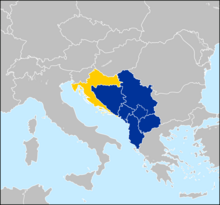Regional Roaming Agreement
The Regional Roaming Agreement, formally the "Agreement on the price reduction of the roaming services in public mobile communications networks in the Western Balkans region", regulates the imposition of roaming charges within the countries in the Western Balkans; Albania, Kosovo, Bosnia and Herzegovina, North Macedonia, Montenegro and Serbia. The agreement covers both the charges mobile network operators can impose on their subscribers for using telephone and data services outside of the network's member state, and the wholesale rates networks can charge each other to allow their subscribers access to each other's networks.
The agreement came into effect from 1 July 2019, with reduced tariffs. On average, prices for outgoing calls dropped by 65% and prices for data transfer dropped by 78%.[1]
From 1 July 2021 all tariffs was be removed, meaning no surcharge to the domestic retail price for calls, SMS & data while roaming in Western Balkans.[2][3][4]
History[]
Representatives of the economies from the Western Balkans gathered in Brussels 14 December 2018 to discuss the new Regional Roaming Agreement (RRA), at the meeting of the Western Balkans Roaming Policy, organized by the Regional Cooperation Council (RCC).[5]
On 4 April 2019, at the 2nd Western Balkans Digital Summit in Belgrade, the Western Balkan Ministers for Telecommunications signed an agreement to gradually remove all roaming costs in the region. The agreement came into effect from 1 July 2019, with reduced tariffs, and from 1 July 2021, all tariffs should was removed, under the concept “Roam like at Home”.[6][2]
Territorial extent[]

The Agreement on the price reduction of the roaming services in public mobile communications networks in the Western Balkans region apply to the countries in Western Balkans:
Majlinda Bregu, the Secretary General of the Regional Cooperation Council (RCC) and the European Commissioner for Digital Economy and Society, Mariya Gabriel discussed the new Regional Roaming Agreement (RRA2) for the Western Balkans in Skopje on 18 February 2019. Commissioner Gabriel confirmed that, once the Western Balkans reaches a new agreement on roaming prices among its economies, the EU stands ready for the reduction of tariffs, as of July 2019.[7]
The RCC will start working with the European Union on reducing roaming charges between the Western Balkans and the EU.[2]
Prices[]
| 1 July 2019 | 1 July 2021 | |
|---|---|---|
| Outgoing calls | 0.19 | home network local rate |
| Outgoing text message | 0.06 | home network local rate |
| Data transfer | 0.025 | home network local rate |
See also[]
- Roaming
- Telecommunications in Europe
- European Union roaming regulations
References[]
- ^ "Regional Cooperation Council | Roaming Prices Drastically Drop across Western Balkans: Speak more, surf more – pay less!". rcc.int. Retrieved 19 September 2019.
- ^ a b c Council, Regional Cooperation. "Regional Cooperation Council | Regional Roaming Agreement is clear: Roaming charges in the Western Balkans are now ZERO". www.rcc.int. Retrieved 30 November 2021.
- ^ EWB (4 July 2021). "The Regional Roaming Agreement – A success story that the Western Balkan needs". European Western Balkans. Retrieved 30 November 2021.
- ^ "The Western Balkans become a roaming free zone: the "Roam Like at Home" regime starts on 1 July with the support of the EU". ec.europa.eu. Retrieved 30 November 2021.
- ^ EWB (14 December 2018). "Western Balkans moving towards a roaming free region". European Western Balkans. Retrieved 9 April 2019.
- ^ "Western Balkans to Scrap Roaming Costs From 2021". Balkan Insight. 4 April 2019. Retrieved 9 April 2019.
- ^ EWB (20 February 2019). "Western Balkans finalising the agreement for a zero roaming rate by 2021". European Western Balkans. Retrieved 9 April 2019.
- Telecommunications in Europe
- Telecommunications in Albania
- Telecommunications in Bosnia and Herzegovina
- Telecommunications in Kosovo
- Telecommunications in North Macedonia
- Telecommunications in Montenegro
- Telecommunications in Serbia
- Balkans
